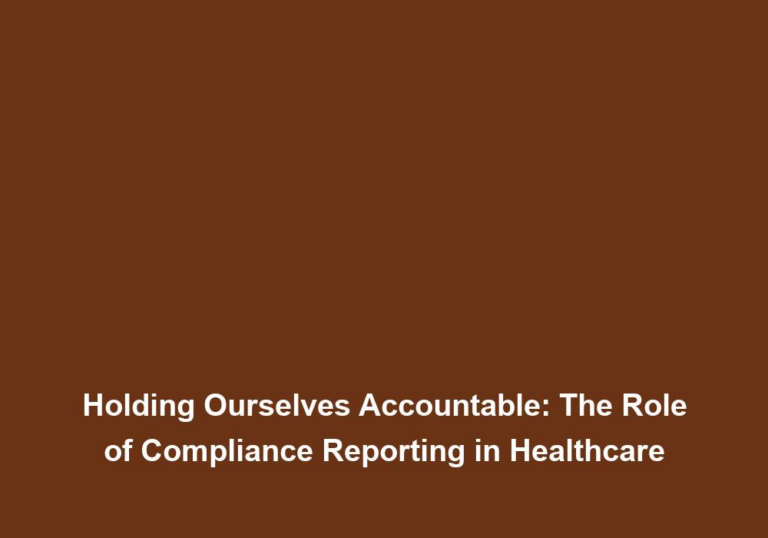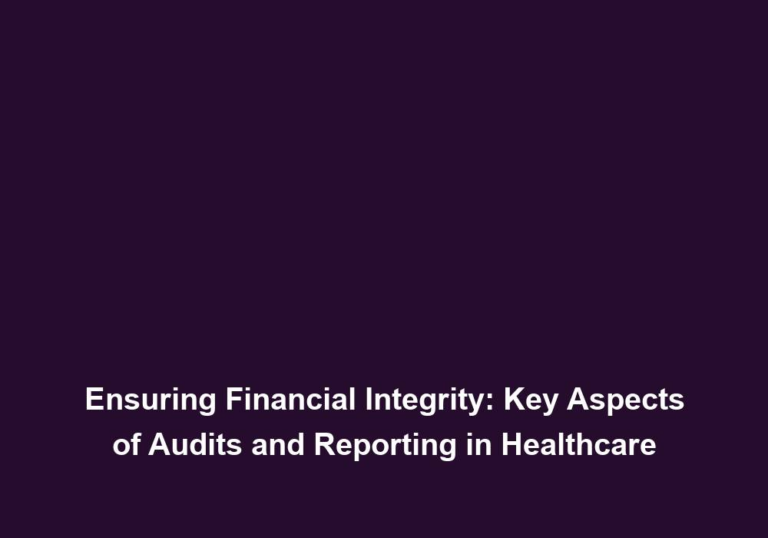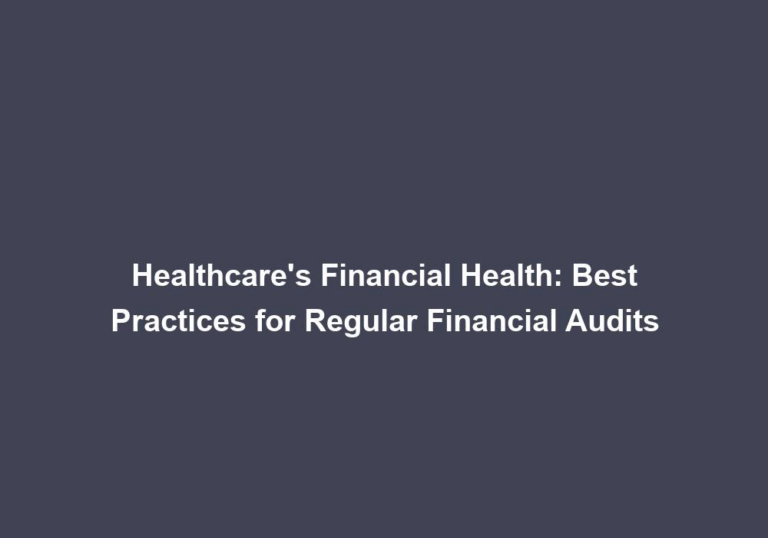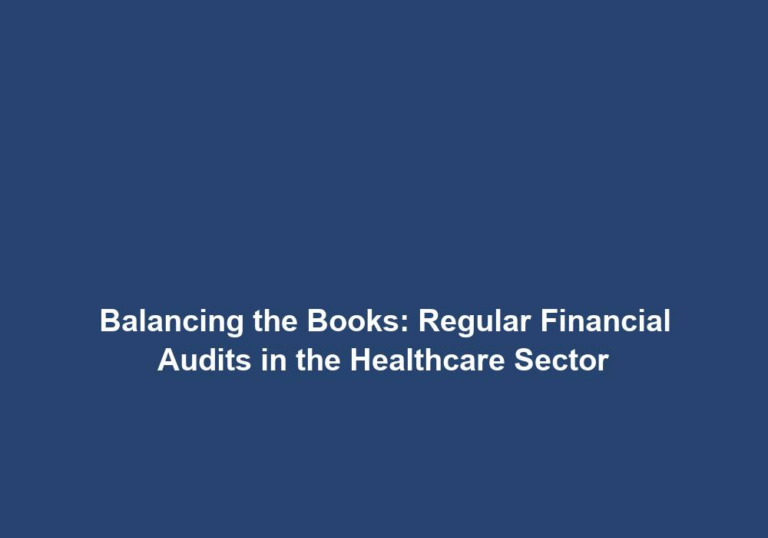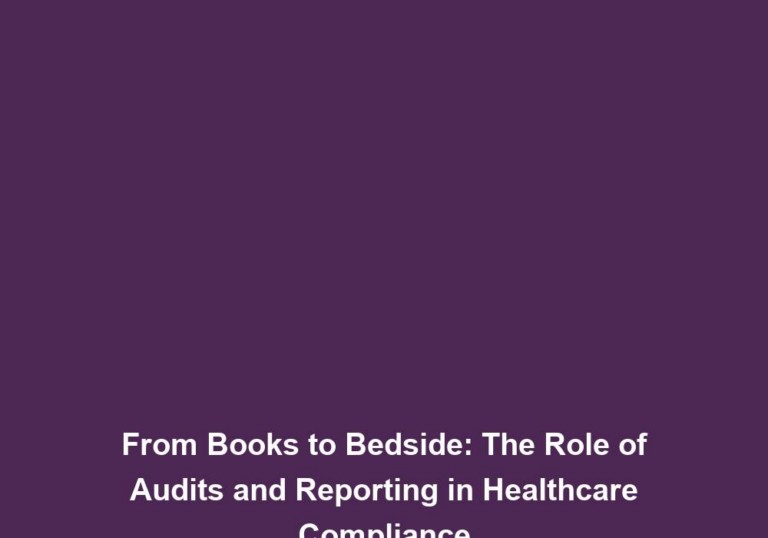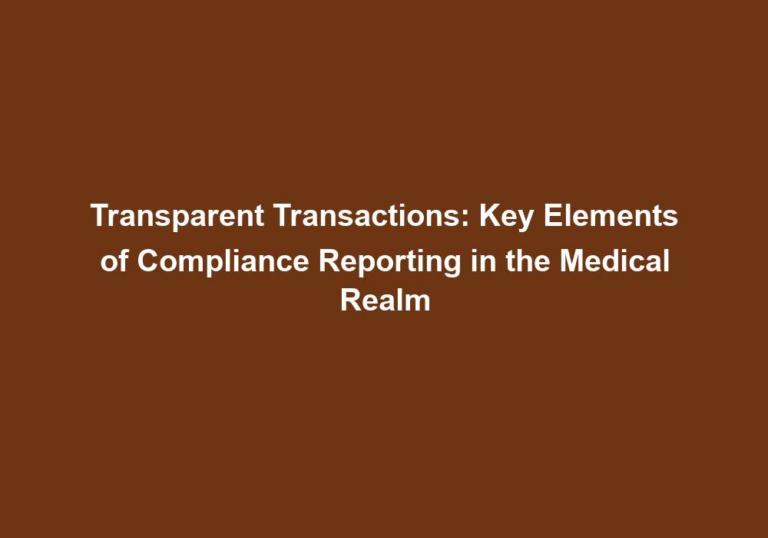Beyond the Numbers: Ensuring Compliance through Accurate Reporting
In today’s fast-paced business environment, accurate reporting is crucial for organizations to ensure compliance with various regulations. It goes beyond mere numbers and financial statements, encompassing a wide range of information that is essential for ethical and legal operations. In this article, we will explore the importance of accurate reporting and how it can help organizations maintain compliance.
Why Accuracy in Reporting Matters
Accurate reporting serves as the backbone of compliance for organizations across various industries. It helps businesses meet legal requirements, maintain transparency, and build trust with stakeholders. But what exactly does accurate reporting entail? Let’s delve into some key aspects:
1. Financial Reporting
Financial reporting forms a significant part of accurate reporting. It involves the timely and accurate recording of financial transactions, preparation of financial statements, and adherence to accounting standards. Accurate financial reporting provides essential information to stakeholders, including investors, regulators, and lenders, enabling them to make informed decisions.
Accurate financial reporting is crucial in providing stakeholders with a clear picture of an organization’s financial health. It allows investors to assess the profitability and stability of a company, regulators to monitor compliance with accounting standards, and lenders to evaluate the creditworthiness of an organization. By ensuring accurate financial reporting, organizations can instill confidence in their stakeholders and maintain compliance with financial regulations.
In order to achieve accurate financial reporting, organizations must establish robust internal controls to ensure the integrity and accuracy of financial data. This includes implementing effective data collection processes, conducting regular reconciliations, and performing thorough financial analysis. Additionally, organizations should invest in modern accounting software and tools to streamline financial reporting processes and minimize errors.
2. Regulatory Compliance
Beyond financial reporting, accurate reporting extends to regulatory compliance. Organizations must comply with a plethora of regulations specific to their industry, such as data privacy laws, labor regulations, environmental standards, and more. Accurate reporting ensures that organizations adhere to these regulations, minimizing legal risks and potential penalties.
Accurate reporting plays a critical role in regulatory compliance by providing organizations with the necessary information to meet their legal obligations. It involves accurately documenting and reporting relevant data, such as employee records, environmental impact assessments, and customer data protection measures. By maintaining accurate records and reporting on a timely basis, organizations can demonstrate their commitment to upholding regulatory requirements.
To ensure accurate reporting for regulatory compliance, organizations should establish clear policies and procedures that outline reporting requirements for each applicable regulation. They should also invest in training programs to educate employees on their reporting responsibilities and provide them with the necessary tools and resources to meet compliance requirements. Regular monitoring and internal audits can help identify any discrepancies or non-compliance issues, allowing organizations to take corrective actions promptly.
3. Risk Management
Accurate reporting plays a crucial role in effective risk management. By providing comprehensive and reliable information, organizations can identify and mitigate potential risks promptly. This includes assessing operational risks, compliance risks, reputational risks, and any other risks that may impact the business. Accurate reporting helps organizations stay proactive and responsive in their risk management efforts.
Accurate reporting enables organizations to identify and assess potential risks by providing them with reliable information. It allows organizations to monitor key performance indicators, track trends, and identify areas of concern. By analyzing accurate reports, organizations can make informed decisions and take necessary actions to mitigate risks.
To ensure accurate reporting for risk management purposes, organizations should establish robust risk assessment frameworks and reporting structures. This includes defining key risk indicators, establishing reporting protocols, and implementing regular risk monitoring processes. By integrating accurate reporting into their risk management practices, organizations can enhance their ability to mitigate risks and protect their business interests.
4. Transparency and Accountability
Transparency and accountability are vital for sustainable business practices. Accurate reporting fosters transparency by providing stakeholders with a clear view of an organization’s performance, financial health, and compliance efforts. It enhances trust among shareholders, employees, customers, and other stakeholders, boosting the organization’s reputation and credibility.
Accurate reporting promotes transparency by providing stakeholders with accurate and reliable information about an organization’s activities. It allows stakeholders to assess the organization’s performance, financial position, and adherence to ethical and legal standards. By being transparent in their reporting, organizations can build trust and confidence among their stakeholders, leading to stronger relationships and long-term sustainability.
To ensure transparency and accountability through accurate reporting, organizations should establish clear communication channels and reporting mechanisms. This includes providing stakeholders with access to relevant reports and disclosures, conducting regular meetings and discussions, and addressing any concerns or inquiries promptly. By prioritizing transparent reporting practices, organizations can strengthen their reputation and maintain the trust of their stakeholders.
The Challenges of Accurate Reporting
While accurate reporting is essential, it does come with its fair share of challenges. Let’s explore some of the common hurdles organizations face when striving for accuracy:
1. Data Quality and Integrity
One of the primary challenges is ensuring the quality and integrity of data used for reporting purposes. Organizations gather data from various sources, such as financial systems, operational databases, and external platforms. It is crucial to have effective data collection processes and robust data governance practices to ensure accurate reporting.
Data quality and integrity are critical for accurate reporting, as the reliability of the information depends on the accuracy and completeness of the underlying data. Organizations must implement data validation processes to ensure that the data collected is accurate, consistent, and reliable. This includes conducting regular data audits, performing data reconciliations, and implementing data quality controls.
Furthermore, organizations should establish data governance frameworks that define data ownership, data quality standards, and data management processes. This includes setting clear guidelines for data collection, storage, and processing, as well as implementing data security measures to protect sensitive information. By prioritizing data quality and integrity, organizations can enhance the accuracy of their reporting and improve compliance efforts.
2. Data Integration and Consolidation
In today’s digitized world, organizations often operate across multiple systems and platforms, leading to scattered data. Integrating and consolidating data from various sources can be challenging, but it is crucial for accurate reporting. Employing modern technologies and data integration tools can streamline this process, reducing errors and enhancing accuracy.
Data integration and consolidation are essential for accurate reporting, as it allows organizations to have a holistic view of their operations and performance. Organizations should invest in data integration tools and technologies that can automate the process of collecting and consolidating data from different sources. This includes leveraging data integration platforms, using application programming interfaces (APIs) for seamless data exchange, and implementing data governance practices to ensure data consistency.
By integrating and consolidating data effectively, organizations can minimize the risk of data discrepancies and errors, leading to more accurate and reliable reporting. It also allows for better data analysis and decision-making, as stakeholders have access to comprehensive and up-to-date information.
3. Interpretation and Application of Standards
Different industries have specific reporting standards and regulations that organizations must comply with. Interpreting and applying these standards correctly can be complex, as they often involve technical language and intricate rules. Organizations must invest in training and development programs to ensure their reporting professionals are well-versed in the relevant standards and regulations.
Interpreting and applying reporting standards and regulations accurately is crucial for ensuring compliance and accurate reporting. Organizations should provide comprehensive training programs to their reporting professionals, keeping them updated on the latest reporting standards and regulations. This includes providing resources such as industry-specific guidelines, reference materials, and training sessions conducted by subject matter experts.
Furthermore, organizations should establish internal controls and review processes to ensure the accuracy and consistency of reporting. This includes conducting regular internal audits, seeking external feedback from industry experts, and engaging professional advisors when necessary. By investing in training and maintaining a thorough understanding of reporting standards, organizations can ensure accurate and compliant reporting.
4. Timeliness and Compliance Deadlines
Accurate reporting requires timely submission of reports and adherence to compliance deadlines. Organizations must implement efficient reporting processes and establish clear timelines to ensure timely submissions. Failure to meet these deadlines can result in reputational damage, financial penalties, and even legal consequences.
Timeliness and compliance deadlines are crucial for accurate reporting, as they demonstrate an organization’s commitment to transparency and compliance. Organizations should establish reporting calendars and workflows that outline reporting responsibilities, deadlines, and escalation procedures. This includes setting up reminders and notifications to ensure that reporting professionals are aware of upcoming deadlines and can allocate sufficient time to prepare accurate reports.
It is also essential for organizations to have contingency plans in place to address any potential delays or issues that may arise during the reporting process. This includes having backup resources, such as additional reporting staff or external consultants, to ensure that reporting deadlines are met.
Best Practices for Accurate Reporting
To overcome the challenges associated with accurate reporting, organizations can adopt several best practices:
1. Establish Robust Data Governance
Implementing effective data governance practices is crucial for maintaining data quality and integrity. This includes defining data ownership, establishing data quality standards, and implementing data validation processes. Regular data audits and ongoing data management efforts are vital to ensure accurate reporting.
Robust data governance ensures that organizations have clear guidelines and processes in place for data collection, storage, and processing. It involves establishing data ownership to ensure accountability, implementing data quality standards to maintain data integrity, and conducting regular data audits to identify and rectify any data discrepancies. By prioritizing data governance, organizations can maintain accurate and reliable reporting.
2. Invest in Reporting Tools and Technologies
Leveraging modern reporting tools and technologies can significantly enhance accuracy and efficiency. Automated reporting solutions, data visualization tools, and integrated reporting platforms can streamline the reporting process, minimize errors, and provide real-time insights. Organizations should assess their reporting needs and invest in appropriate tools to support accurate reporting.
Investing in reporting tools and technologies allows organizations to automate manual reporting processes, reducing the risk of errors and improving efficiency. These tools can help in data integration, report generation, and data visualization, enabling organizations to present accurate and meaningful information to stakeholders. By leveraging reporting tools and technologies, organizations can enhance the accuracy and effectiveness of their reporting efforts.
3. Train and Educate Reporting Professionals
Organizations must invest in training and continuous education for their reporting professionals. This includes staying updated on the latest reporting standards, regulations, and industry best practices. By equipping reporting professionals with the necessary knowledge and skills, organizations can ensure accurate and compliant reporting.
Training and education are essential for reporting professionals to stay abreast of the evolving reporting landscape. Organizations should provide regular training sessions, workshops, and access to resources that focus on reporting standards, regulations, and industry-specific requirements. By investing in the development of reporting professionals, organizations can ensure accurate reporting and maintain compliance with reporting standards.
4. Regularly Monitor and Review Reporting Processes
Continuous monitoring and review of reporting processes are essential to identify any potential issues or areas for improvement. Conducting periodic internal audits and seeking external feedback can help organizations identify gaps and rectify them promptly. This proactive approach ensures accuracy and boosts overall compliance efforts.
Regular monitoring and review of reporting processes allow organizations to identify any weaknesses or inefficiencies that may impact the accuracy of reporting. This includes conducting periodic internal audits to assess compliance with reporting standards and identify areas for improvement. Organizations should also seek external feedback from industry experts or engage professional advisors to gain insights into best practices and areas of improvement.
By regularly monitoring and reviewing reporting processes, organizations can identify and address any issues or gaps that may impact the accuracy of reporting. This continuous improvement approach ensures that reporting processes are efficient, effective, and compliant with reporting standards.
Conclusion
Accurate reporting is essential for organizations to ensure compliance, maintain transparency, and build trust with stakeholders. By prioritizing accurate financial reporting, regulatory compliance, risk management, transparency, and accountability, organizations can overcome the associated challenges and reap the benefits. Adopting best practices such as robust data governance, leveraging reporting tools and technologies, investing in training, and regular monitoring can significantly enhance accuracy in reporting. Remember, accurate reporting goes beyond numbers – it is an integral factor in the long-term success and sustainability of organizations.
Disclaimer: The content generated above is for informational purposes only and should not be considered as legal, financial, or professional advice. Organizations should consult with appropriate experts and authorities for their specific reporting and compliance requirements.


